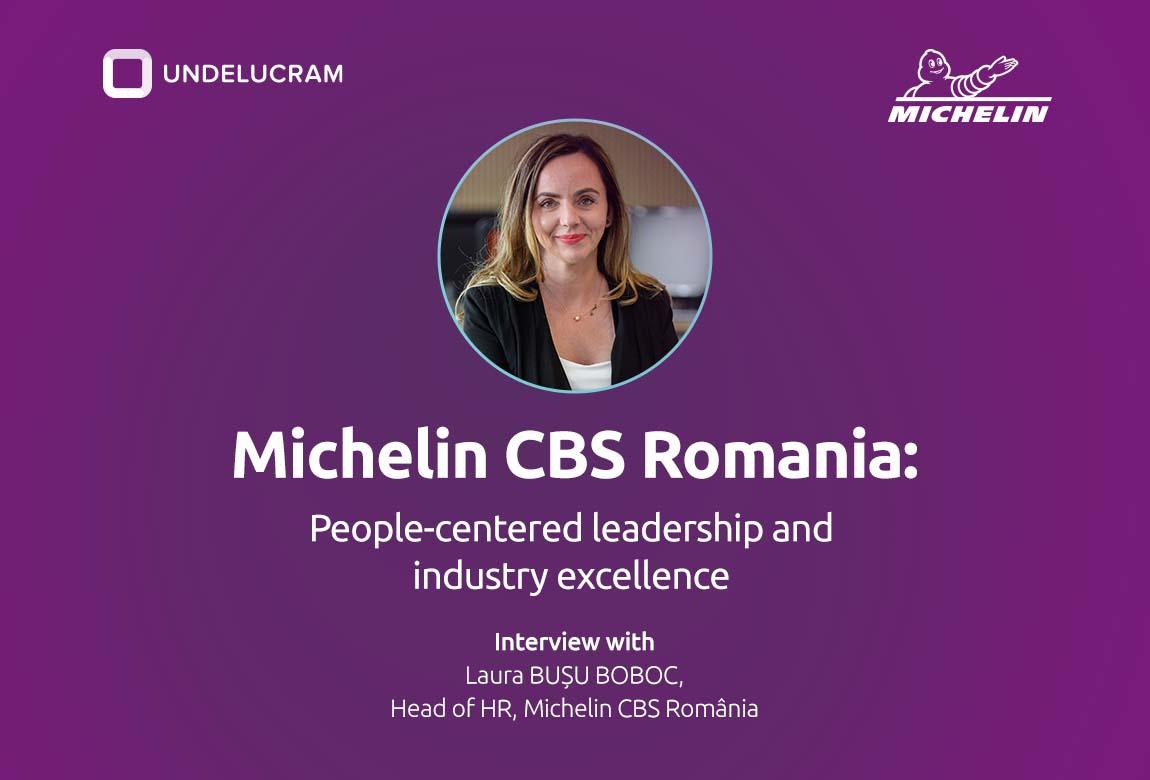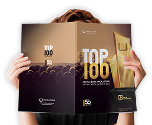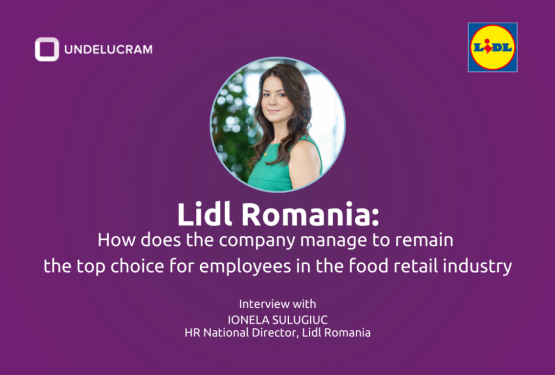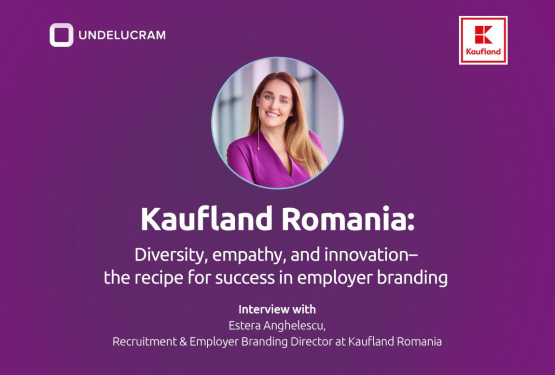Share
Michelin CBS Romania: People-centered leadership & industry excelence

We continue the series of interviews with experts from the companies included in the Top 100 Employers on Undelucram.ro. Through these interviews, we aim to highlight some of the most remarkable employers in Romania and show you what makes a company appreciated by its employees.
Today, we shine the spotlight on Michelin CBS Romania, ranked fourth in the Industrial Production category. We want you to discover with us what practices make this company stand out and position itself at the top of Undelucram.ro 2024. To better understand these strategies, we spoke with Laura Boboc, Head of HR.
With over 18 years of experience in human resources, Laura joined the Michelin CBS team more than two years ago. We invite you to explore in this interview some of Laura’s and her HR team’s strategies, which help the company’s employees continuously evolve alongside the organization.
1. How would you describe the company’s organizational culture and what makes this culture attractive to potential employees?
Michelin is a company with tradition, which has built over time a culture of Long-Life Learning, where innovation and development are at home. Continuous evolution, career plans, constant dialogue with employees, psychological safety, and well-being are aspects we pay great attention to, and they are reflected in our results: we have an attrition rate of 8.5% in 2024, half of my colleagues at Michelin CBS have been with the company for over 5 years, many of them coming from other sites and celebrating 10, 15, or even 20 years with the company. Additionally, 30% of our vacancies are filled based on internal recommendations. Or we can look at the smiles of our colleagues, the relaxed dynamics between them, and see how much laughter there is, whether we are watching a group of colleagues in the game and relaxation room, the cafeteria, or the office area.
The company culture is I CARE, which is an acronym for the values within the organization: Inspire, Create Trust, Awareness, Results, and Empowerment. We value authenticity, self-awareness, and emotional intelligence—key traits and behaviors expected from leaders in the organization. As I mentioned earlier, the focus is on development and the mindset of lifelong learning, and here we meet our colleagues with various programs they can access: from job-specific technical training to soft skills training, as well as long-term academies (3-6 months) developed internally. Some of the most appreciated programs are the Finance Academy, Green Belt, and Citizen Bootcamp. The latter is a 6-month program where participants learn how to use low-code and no-code applications. Each participant also has a dedicated mentor and is involved in practical projects within the organization.
2. What aspects of the work environment do you consider to be most appreciated by employees and potential candidates?
There are many internal projects we develop based on feedback from colleagues, aside from the standard wellbeing package included in our benefits: life insurance, medical insurance, access to a dedicated benefits platform, psychological support line, etc. The most appreciated aspects are the relaxation areas, game areas, the office space with many plants and natural light, annual teambuilding programs, and regular meetings or activities within teams.
In 2023, we started a monthly program, Fun@Work, where colleagues can participate in creative workshops, board games, and dance – activities that we either organize with the support of external partners or are hosted by colleagues from within the organization who have developed a passion and want to share it with others.
We celebrate Wellbeing Day annually, with workshops on topics such as nutrition, sports, mental health, mindfulness sessions, and personal development. We also give colleagues the opportunity to participate in CSR and volunteer activities, allowing them to connect with local communities and contribute to the projects we develop in this direction. We have an internal book club where participating colleagues receive books and meet as a community to discuss them.
In addition to all of these, we prioritize creating a safe working space, which we call Safe Space, and a culture where we put people first. We ensure that we are respected at the workplace, listened to, and accepted as individuals.
3. How do you see the impact of leadership on attracting and retaining talent in the context of the labor market in Romania?
Our leadership style is derived from Michelin's culture – in our strategy, we have objectives and priorities for People, Profit, and Planet. This is exactly the order of priorities, with all leaders primarily focused on people. Every employee has regular discussions with their direct manager, and a summary of these is uploaded into the system each quarter, with a defined set of competencies that are self-assessed and then validated with the manager. Formal development objectives and learning plans are documented in the system. Annually, for each team member, the manager organizes a career discussion, together with the HR team, with other relevant colleagues who have worked with the person. We also have the annual performance evaluation process, but the career process is a priority for us. We have a talent management strategy in the organization, with dedicated and personalized learning and development programs.
I’ve discussed leadership’s impact on retention, and now I’ll turn to Romania’s labor market. It’s a challenging market, especially when looking at recruiting young graduates or those with less than five years of experience, Generation Z. We’re actively involved in student communities, engaging with them right from the start of university, whether through informal discussions or by presenting case studies in certain courses or at our headquarters, where we bring the practical side of business alongside the theoretical part from their studies. For example, my colleagues in Finance taught students how to account for tire production; colleagues from the plants welcome students on factory visits, and in 2025, in partnership with FABIZ, a group of students will visit the Michelin headquarters in France, including the research center, the L’Aventure Michelin museum, and the Ladoux circuit.
We value results, but we ensure a balance with care for people. We believe in collective intelligence and collaboration, authenticity, and self-awareness, and we seek these qualities in each of us, regardless of role – leaders can be informal too, not just those in official positions.
4. What measures do you implement to keep the company competitive in Romania's labor market and attractive to candidates, considering current trends?
We are part of the Shared Service Center (SSC) industry, which is continuously growing. Over 60% of companies with headquarters in Romania have stated they want to expand their operations, and over 90% of them have said that Romania is a good place for investment (source: ABSL). Our Shared Services Center in Bucharest has over 900 employees and will continue to grow this year.
My role as HR leader is to support the business strategy, and I focus on four areas: attracting and retaining talent, performance management, learning & development, and culture & climate, which I’ve detailed above. Of course, a competitive company is one that maintains competitive salaries on the market, and Michelin updates salary grids annually. These grids are visible to everyone, and each employee can see the internal level for their position (according to Hay), the salary compa-ratio at which they are paid, and the annual median adjustments.
Regarding the work model, we work hybrid and will continue in this format – we will not work entirely from home, nor will we return fully to the office.
5. What do you consider to be your most important contribution to the company’s success so far?
There are numerous projects and actions I’ve implemented and coordinated or been part of, but all of them were made possible through sustained team effort. It’s the work of top management colleagues, those in HR, and other colleagues who want to get involved in HR projects. I’m happy to have had the opportunity to join Michelin, to discover this culture, and to live the practical side of collective culture daily. It’s hard, if not impossible, to say that a specific contribution was exclusively personal; moreover, annual objectives in our organization are not individual, they are shared objectives, established at the group, regional, or team level.
6. What initiatives or projects have you led that had the greatest impact on the organization?
Trust, fairness, respect, and transparency are Michelin's values that guide our actions. Four years ago, we implemented a transparent system for salary grids, role classification within the organization, and the positioning of each employee on the grid. Every colleague knows their internal classification, how their role compares to similar roles on the market and can view the job evaluations for the entire company, including the skills and competencies required for each role. All this information is hosted on an internal platform, accessible to all employees, launched in 2023 and completed in 2024. It’s a platform that is appreciated because it explains what each department does, and what roles align with your experience and skills, and it also provides access to a range of recommended courses to help you grow the competencies required for the role you're aiming for.
One of the most recent development programs was launched in 2024 when we started rolling out the Fearless Organization Scan (FOS) workshops. These workshops use a tool to measure the level of psychological safety in teams, which was developed based on research by Professor Amy C. Edmondson from Harvard Business School. It’s used to assess and improve psychological safety within organizations. Two HR colleagues are certified trainers, and in 2024 we facilitated FOS workshops for over 270 employees in Bucharest and Budapest. The next steps will involve organizing workshops for the rest of our colleagues in Bucharest, and, according to FOS methodology, we will conduct a second evaluation for the teams that participated in the workshops in 2024. This program will allow us to create the best possible psychological safety environment for each of us, enabling us to grow and develop together.
Last but not least, in the final quarter of 2024, we implemented internal PCM (Process Communication Model) certification, and to date, about 20% of our employees have undergone this training. PCM helps individuals to better understand themselves, identify their preferred communication style, and recognize situations that bring them stress. It’s an excellent tool for all of us, helping with team dynamics, and delicate conversations, and laying the foundation for effective, authentic communication – essential for emotional comfort.
7. How do you support the professional development of your team members?
First and foremost, by being present – being there to observe what strong competencies the team member has, what areas need further development, what they enjoy doing, and what they don't. Feedback and open discussions are the next step. It’s important to give constructive feedback to each individual, identify which competencies they need to develop and create a personalized development plan (formal training, informal learning, attending events, getting involved in projects, mentoring, etc.). Just as important, or perhaps even more so, is to listen to them, and understand what they want. Some colleagues are aiming for management roles, some are focused on a particular area of expertise, others want to change fields, and some still don’t know which direction to go in. For those who aren’t sure yet about the direction, guidance and mentoring are necessary, and for those who’ve chosen a direction, we move into the coaching zone. Each person is unique, and it’s a joy to be part of someone’s career development.
8. How do you ensure a balance between performance and team wellbeing?
If the team is well, performance follows. I don’t think it’s about balance, in the sense of finding the right place closer to performance or team well-being, as if they were extremes on the same axis. Wellbeing and performance go hand in hand. Indeed, clear communication of direction, mutual understanding of priorities, continuous communication, willingness to help, and a constructive attitude toward risks and mistakes are necessary. We also have a team routine that helps us get to know each other as people, not just through the roles we have within the team. We start the week together on Monday morning with discussions about the weekend and the priorities for the week ahead. Even though we work in a hybrid model, each choosing their days to work from home and in the office, we allocate time for activities that bring us together: team meetings, workshops, team-building activities, Fun@Work, etc.
9. What key trends do you see shaping the labor market, and how does the company align its strategies to stay ahead?
The labor market in Romania, especially in Bucharest, is very dynamic and competitive. There are many career opportunities, and we observe a trend among young people to start working as early as their second year of university and frequently change employers. A few years ago, we would talk to students about the rules they should follow when drafting their CV to be contacted and selected by an employer. Now, we approach young people to help them understand how to choose the right employer for them, for their professional aspirations. And we do this through all our partnerships with universities and student associations.
To remain relevant to our employees, we focus on culture, climate, values, continuous communication, and transparency. We have a well-defined business strategy, with clear plans until 2050. We dedicate a lot of time to communicating the vision and strategic direction to all colleagues. In order to stay in an organization, people need to know the future plans, to understand that the organization has the capacity to transform, and innovate, and they need to know how they can contribute to this transformation, what role they play, and what it brings for their future career.
10. How do you maintain a balance between integrating new technologies and keeping a human-centered approach in workplace relationships?
We try to keep pace with technological developments, implementing them into our daily routines to streamline repetitive tasks and focus on those that bring value to the organization. We start from the business needs and the efficiency improvements identified by our colleagues who work daily with specific processes and tools. To find the most suitable solutions, we created a dedicated program, Citizen Bootcamp, an incubator for ideas that gives my colleagues the opportunity to be part of a learning community that proposes and finds digital solutions for various processes. The program is highly appreciated, the colleagues involved are volunteers, supported by their teams and managers to deliver the solutions they’re responsible for as part of their regular work, and last year's edition was a real success – it brought together over 70 colleagues, who, with the help of 42 trainers, delivered 75 internal digital projects.
11. How does the company support graduates in the transition from education to the labor market? Are there specific initiatives or programs to facilitate this process?
We are actively involved with the youth communities in Bucharest and surrounding areas who wish to start a career with us – we offer them the opportunity to get to know us, through a paid internship lasting several months in one of our teams (HR, Procurement, Logistics, Finance, Order to Cash, Source to Pay), aligned with all the benefits. We work closely with the FABIZ Faculty, part of ASE, where we actively participate in the faculty's courses, organize Open Doors events at our office, and guide students in pursuing their internship or working on their thesis or master's thesis alongside my colleagues.
12. What message would you send to candidates who might be interested in joining your team?
My first advice would be to get in touch with us, with our recruitment team, and to check the opportunities we offer on our careers website. They can also find us on LinkedIn or other recruitment platforms, where we regularly post about open roles, and the competencies we are looking for, as well as other information about our colleagues, training programs, and events we participate in where they could meet us for a face-to-face discussion. As our slogan says – Together, we support life in motion, and we all contribute our talent to the company’s purpose.
13. How do you encourage a culture of continuous feedback from employees, and how does this contribute to maintaining your company’s status as a top employer?
The culture of feedback is strong at Michelin. We have various frameworks in place to capture both formal and informal feedback. At the macro level, we have created a dedicated calendar of internal events where we share the most important business messages, updates on major projects, and ongoing programs to ensure that all colleagues at Michelin CBS are on the same page. We organize Town Hall events at the CBS level twice a year, quarterly at the Service Line level, and in addition, since 2023, we have launched informal Ask Me Anything events. Here, my colleagues can join Top Management and ask any questions regarding the organization, future direction, and projects, as well as more personal aspects about the management team, to get to know them better and create stronger bonds.
Additionally, we have the internal program How are you?, where HR colleagues talk with people from across the organization about different topics related to their professional life and how they feel at the office. We also hold face-to-face meetings with every employee who leaves the company, and we conduct an annual employee survey, from which we gather suggestions for improvement. The results of the survey are transparently communicated at the center and team level, along with the action plan that emerges from it.
However, beyond these events and the meetings between HR colleagues and employees, the ongoing dialogue that managers have with their team members is extremely important: this dialogue is open, natural, and in real-time, and it gives us the opportunity to make quick adjustments based on employee feedback.
Are you looking for a job in industrial production?
Join one of the Top 100 Employers on Undelucram.ro! Visit Michelin's company page on Undelucram.ro and explore the benefits you could have as an employee in a company that is committed to your professional development and creating a psychologically safe environment for each colleague.
Comments
0 comments

Access your account and add your comment
Undelucram interviews
Subscribe to the Newsletter
Read articles of interest from Undelucram.ro contributors





